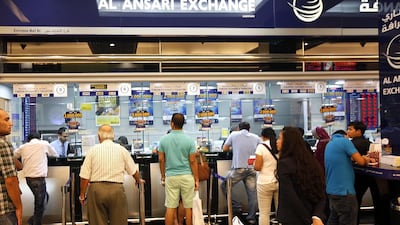DUBAI // A new online remittance service will allow Indian expatriates to use their credit or debit cards to send home money in real time.
Instead of waiting in queues at exchange houses, expatriates can register with remit2india.com and use their cards to transfer money online, in a first.
But social workers are wary that the service could lead to expatriates swiping their credit cards indiscriminately, pushing them into huge debts.
“The entire basis of our service being 100 per cent online is convenience for the customer,” said Bhairav Trivedi, chief executive of Network International, a Middle East payment solutions provider based in the UAE.
The company is a majority stake-holder in TimesofMoney in Mumbai, which offers the online remittance service.
“When a person uses remit2india, he can send money from anywhere and at any time he wants,” Mr Trivedi said.
“As it is a 24/7 service, using it saves customers the pain of having to wait in queues or restrict themselves to banking hours to transfer money.”
He said this was the first time a non-bank organisation in the UAE offered online money transfers to Indian expatriates.
But K V Shamsudheen, chairman of the Pravasi Bandhu Trust, which offers free financial advice to expatriates and low-income workers, urged people to be thrifty and save for their future.
“This is an invitation to fall into debt,” Mr Shamsudheen said. “The problem is people will use their overdraft facilities to send money.
“Many will use this as another opportunity to take loans without considering they have to pay 40 per cent or more as accumulated interest.”
K Kumar, head of the Indian Community Welfare Committee, which deals with more than 50 cases related to financial issues a month, agreed.
He said that of those cases at least half were related to credit card debts.
“Certainly, it will be a natural temptation to borrow heavily if you can punch in a few numbers and transfer money,” Mr Kumar said.
The Indian embassy runs a workers resource centre, which dealt with five cases of credit card debts and seven from bank loans last year.
Only one case, someone with credit card debts, has been reported to the centre this year.
Expatriates are also known to take bank loans to remit money whenever the Indian rupee falls steeply.
Mr Kumar said his group dealt with debt-ridden expatriates all the time.
“It is a regular feature,” he said. “They give cheques to banks that they can’t honour or have problems after overspending on their credit card. They say they took the money for a medical emergency but can’t really substantiate it.
“People should never overspend for remittance or otherwise. A credit card is for safety. It shouldn’t be abused.”
But Mr Trivedi said remittance was a necessity and the company’s new service would not push people into debt. “The first and foremost need for Indians sending money home is family maintenance. This is a fixed and stable need for most expatriates and is fulfilled from their means of livelihood.”
“Where other expenses may see a splurge in spending, customers generally do not run the risk of a debt trap to fulfil essential needs like remittances.
“It will be fallacious to link the pattern of credit-card spending to possible incurring of debts for money remittances,” Mr Trivedi said.
For financial or other counselling, expatriates can call the Indian Workers Resource Centre experts on 800 INDIA (800 46342) or email help@iwrc.ae.in.
pkannan@thenational.ae

